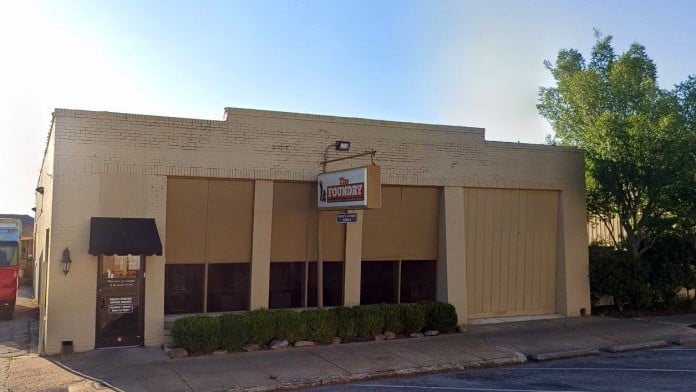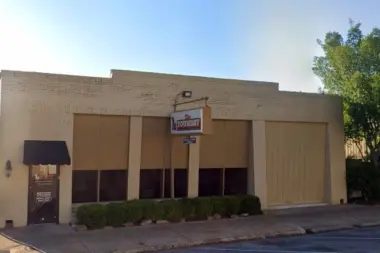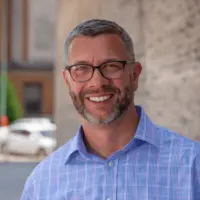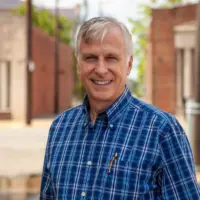My counselor gave me a better understanding of who I am and how can I work with Christ. Remember that rules and boundaries exist for a reason, so it is better if you just follow them up with that. I am grateful for the amount of accountability that they make the patients hav ...
About The Foundry Ministries – Men’s Recovery Program
The Foundry Ministries – Men’s Recovery Program provides residential addiction recovery services for men in Bessemer, Alabama. They’ve received recognition from the Association of Christian Recovery Ministries. Clients can get started with the program by filling out an online application.
Basic Needs to Support Your Recovery
They focus on providing everything you need to focus on your recovery at the facility, plus continued recovery after you leave the program. You’ll stay in an urban setting and receive daily meals. The center features semi-private rooms plus a rec room as well as outdoor areas where you can exercise or relax.
Your treatment will include counseling services, education, employment readiness and spiritual guidance. With employment readiness services, you may receive assistance with resume building and interview prep.
I like that, because this is a men’s program, staff members focus on issues related to what causes men to use substances. Some of the issues related to addiction that might be addressed include anger management and underlying trauma.
Long Term Residential Treatment in Bessemer
The program lasts about nine months, and you’ll be required to stay on campus for at least six months. After the six months, you can choose to continue treatment at home, but if you decide to stay at the facility you’ll be required to seek employment. All clients will be expected to have completed detox before starting the program.
As you make progress in your treatment, you’ll be able to receive passes to enjoy some time at home. Your family will also be able to visit you once a week. When you use your passes, you may want to visit the Watercress Darter National Wildlife Refuge. You can explore the forest and enjoy looking at watercress darter fish in the pond.
Latest Reviews
Rehab Score
Gallery


Other Forms of Payment
Medicaid is a state based program that helps lower-income individuals and families pay for healthcare. Medicaid covers addiction treatment so those enrolled can use their coverage to pay for rehab. When a program accepts Medicaid the client often pays very little or nothing out of their own pocket.
Medicare is a federal program that provides health insurance for those 65 and older. It also serves people under 65 with chronic and disabling health challenges. To use Medicare for addiction treatment you need to find a program that accepts Medicare and is in network with your plan. Out of pocket costs and preauthorization requirements vary, so always check with your provider.
Self-pay involves paying for treatment out of your own pocket. You can use savings or credit, get a personal loan, or receive help from family and friends to fund your treatment. If you don't have insurance or your insurance plan doesn't cover a specific program, self-pay can help ensure you still get the care you need.
Private insurance refers to any kind of healthcare coverage that isn't from the state or federal government. This includes individual and family plans offered by an employer or purchased from the Insurance Marketplace. Every plan will have different requirements and out of pocket costs so be sure to get the full details before you start treatment.
Addiction Treatments
Levels of Care
Residential treatment programs are those that offer housing and meals in addition to substance abuse treatment. Rehab facilities that offer residential treatment allow patients to focus solely on recovery, in an environment totally separate from their lives. Some rehab centers specialize in short-term residential treatment (a few days to a week or two), while others solely provide treatment on a long-term basis (several weeks to months). Some offer both, and tailor treatment to the patient's individual requirements.
Sober Living Houses (SLHs), aka sober homes or halfway houses, are safe, substance-free, supportive living facilities for those recovering from substance abuse. Ideal for those who've just been through inpatient or outpatient treatment, SLHs are supervised environments with rules that support sobriety, such as curfews, shared chores, and therapeutic meetings. Residents are also often trained on life skills and coping skills to make it easier to transition into society. SLHs also provide a strong sense of community that can lead to the kind of deep and lasting connections with other sober individuals that supports a new, healthy lifestyle.
Rehab aftercare programs are designed to provide support to you after completing an addiction treatment program. These programs are highly customized and evolve with your changing needs. You'll partner with staff at the treatment center to identify any specific medical, behavioral, and social services needed to support your sustained sobriety. Aftercare services may include peer coaching, career counseling, and other personalized support.
Treatments
The goal of treatment for alcoholism is abstinence. Those with poor social support, poor motivation, or psychiatric disorders tend to relapse within a few years of treatment. For these people, success is measured by longer periods of abstinence, reduced use of alcohol, better health, and improved social functioning. Recovery and Maintenance are usually based on 12 step programs and AA meetings.
Drug rehab in Alabama provides medical or psychotherapeutic treatment for drug dependency. Methods of treatment often include a combination of medication, counseling, and recreational therapies.
A combined mental health and substance abuse rehab has the staff and resources available to handle individuals with both mental health and substance abuse issues. It can be challenging to determine where a specific symptom stems from (a mental health issue or an issue related to substance abuse), so mental health and substance abuse professionals are helpful in detangling symptoms and keeping treatment on track.
Opioid rehabs specialize in supporting those recovering from opioid addiction. They treat those suffering from addiction to illegal opioids like heroin, as well as prescription drugs like oxycodone. These centers typically combine both physical as well as mental and emotional support to help stop addiction. Physical support often includes medical detox and subsequent medical support (including medication), and mental support includes in-depth therapy to address the underlying causes of addiction.
Programs
Adult rehab programs include therapies tailored to each client's specific needs, goals, and recovery progress. They are tailored to the specific challenges adult clients may face, including family and work pressures and commitments. From inpatient and residential treatment to various levels of outpatient services, there are many options available. Some facilities also help adults work through co-occurring conditions, like anxiety, that can accompany addiction.
Young adulthood can be an exciting, yet difficult, time of transition. Individuals in their late teens to mid-20s face unique stressors related to school, jobs, families, and social circles, which can lead to a rise in substance use. Rehab centers with dedicated young adult programs will include activities and amenities that cater to this age group, with an emphasis on specialized counseling, peer socialization, and ongoing aftercare.
Recovery is most successful when clients feel accepted and validated by their peers and treatment providers. Facilities that offer LGBTQ-inclusive programming are committed to creating a safe space where everyone can grow and recover without fear of judgment or discrimination. They will have dedicated policies in place to create a safe and supportive environment that fosters free expression.
Clinical Services
In individual therapy, a patient meets one-on-one with a trained psychologist or counselor. Therapy is a pivotal part of effective substance abuse treatment, as it often covers root causes of addiction, including challenges faced by the patient in their social, family, and work/school life.
Life skills trainings involve all the skills a person must have in order to function successfully in the world. These include time management, career guidance, money management, and effective communication. Truly successful addiction recovery is based on the ability to not only live substance-free, but to thrive. Life skills teaches the practical necessities of functioning in society, which sets clients up for success in life, and therefore sobriety.
Group therapy provides men and women in Alabama a supportive environment where they can share experiences, build connections, and receive encouragement from their peers who are facing similar challenges with drug addiction and co occurring mental health conditions.
Amenities
-
Residential Setting
-
Private Setting
Staff

Brandon Lackey
Chief of Program Officer

Darrell Garrett
Chief Operating Manager

Micah Andrew
CEO

Paul Barber
CFO

Joey Daly
Chief Development Officer
Contact Information
1804 6th Ave North
Bessemer, AL 35020